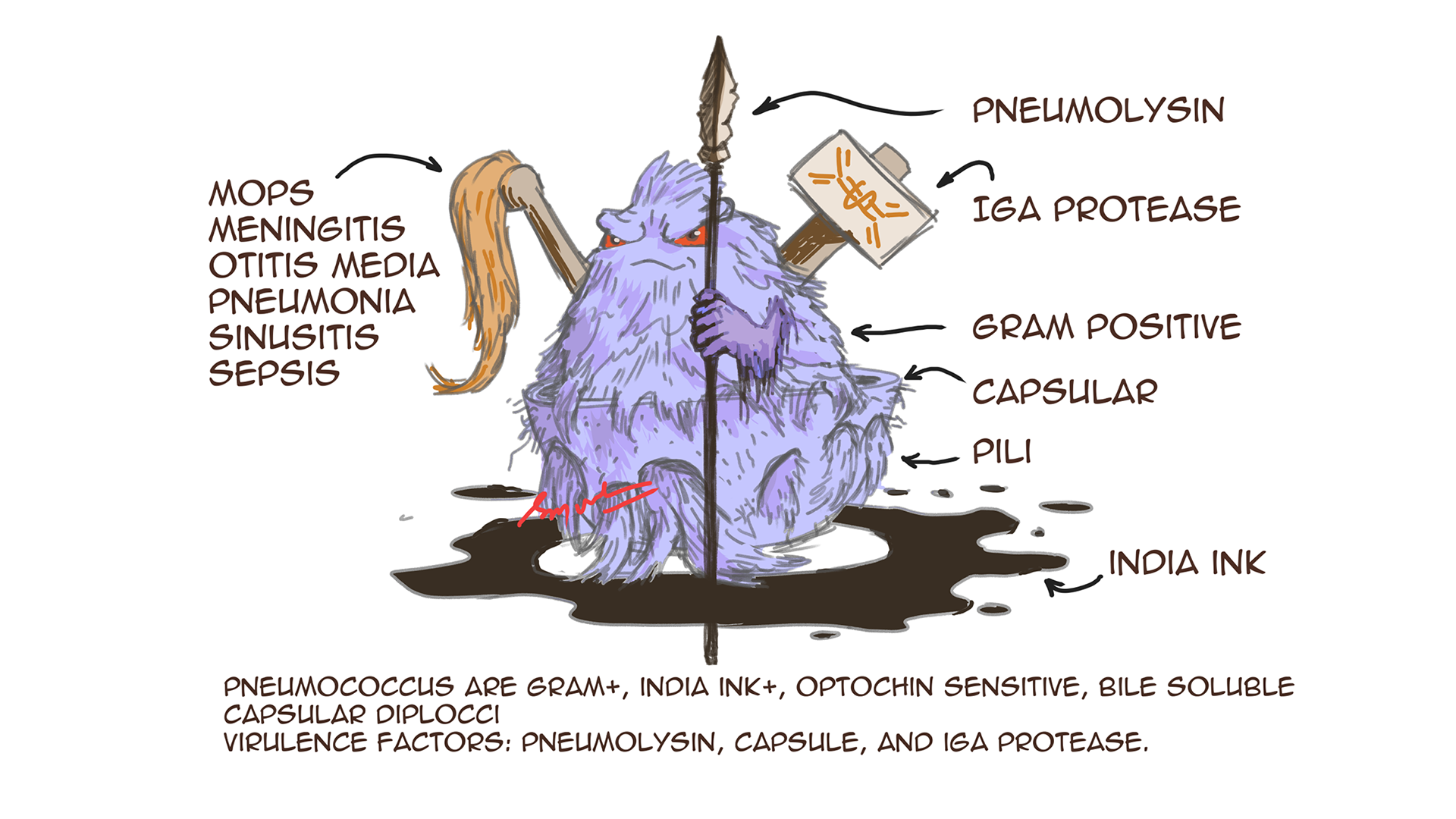
Infectious Diseases
Learn important respiratory infections, including upper and lower respiratory tract infections, types of pneumonia, causative agents of pneumonia and signs and symptoms of typical vs atypical pneumonia.
Listen to amazing pulmonologists discussing lung abscesses, bronchitis and bronchietctasis.
Take a fresh look at the pathogens and the resistance they are developing. Check the most prevelant diseases that healthcare workers have to manage on day to day caused by some of the common pathogens.
Look at the modified duke's criteria for infective endocarditis and the management approach of the infective endocarditis.
Learn the common skin infections and their classifications e.g. carbuncles, fruncles, impetigo, etc., and the management approach.
Learn the etiology, signs, symptoms and the management approach to syphillis.
Learn the vaccination schedule.
Understand the common challenges and solutions to the atypical urinary tract infections (UTIs.)
Learn about diphtheria and its causative agent.
Learn why a cytokine storm is caused by superantigens made by some pathogens.
Learn about primary and secondary tuberculosis and mycobacterium tuberculosis. Although less common in the US, but very important to master nonetheless.
Presenters:
Dr. Mobeen Syed
Dr. Mir M. Alikhan graduated from the University of Texas Medical School. Mir served as chief medical resident at Boston University Medical Center. Mir underwent Pulmonary & Critical Care fellowship training at Emory University in Atlanta, Georgia. He is now board certified in Internal Medicine, Pulmonary Disease, & Critical Care Medicine.
Dr. Ahmed Zaafran is a board certified anesthesiologist at Santa Clara Valley Medical Center and Assistant Professor of Anesthesiology at Stanford University School of Medicine.
Dr. Amr Madkour MD, MPH, FACOG, is board-certified in obstetrics & gynecology and an associate professor at The George Washington University School of Medicine & Health Sciences. Dr. Amr Madkour is the director of the residency program in Obstetrics and Gynecology and enjoys educating the next generation of physicians.
Dr. Luis Verduzco is certified by the American Board of Anesthesiology in anesthesiology and critical care medicine. He completed his undergraduate degree with distinction from Yale University and then went on to medical school at Harvard, having graduated as an Arthur Lehman and LInnane Scholar. Dr. Verduzco received his residency training at Stanford and was elected chief resident during his final year. He stayed at Stanford for critical care fellowship training. He is a former Academy of Achievement Student Delegate and Howard Hughes Medical Institute Research Training Fellow. Dr. Verduzco has authored multiple book chapters and peer-reviewed manuscripts, with primary authorships in prestigious journals such as Stroke and Blood.
Dr Tammy Wang is a Clinical Associate Professor, Anesthesiology, Perioperative and Pain Medicine, and Clinical Associate Professor (By courtesy), Pediatrics at Stanford Medicine.
Course Lectures
-
Staphylococcal Gastroenteritis
06m 42s -
Syphilis: An introduction to etiology, diagnosis, and clinical management
44m 09s -
Atypical Urinary Tract Infections: Common Challenges and Solutions
1h 51m 37s1.75 CME -
Streptococcus Pyogenes - Diseases and The Management Approach
20m 12s0.25 CME -
Penicillin: Mechanism of Action
12m 15s0.21 CME -
Streptococcus Pyogenes - Clinical Foundations
13m 42s0.23 CME -
Staphylococcus Skin Infections Impetigo Folliculitis Furuncles or Boils Carbuncles Cellulitis Surgical Wound
16m 55s0.25 CME -
Current Approaches to Acute Infective Endocarditis (Staphylococcus Series)
07m 23s0.13 CME -
Staphylococcus - Diagnosing Acute Infective Endocarditis (Modified Duke's Criteria)
11m 26s -
Staphylococcal Infective Endocarditis - (Staphylococcus)
11m 49s -
Staphylococcal Gastroenteritis
06m 42s -
Staphylococcal Scalded Skin Syndrome
13m 00s -
Staphylococcus - Toxic Shock Syndrome and Its Management
15m 37s0.25 CME -
Staphylococcus - Superantigens
13m 50s -
Why do superantigens cause cytokine storm?
09m 08s -
Staphylococci Properties, Diseases, Diagnosis, and Management Approach
24m 45s -
Streptococcus Pneumoniae (Pneumococcus) - Pathophysiology and Management
21m 53s0.25 CME -
Streptococcus Viridans
16m 05s0.25 CME -
Antibiotics Overview
58m 29s1.00 CME -
Pneumococcus (memory aid)
18m 03s0.25 CME -
Alpha Hemolytic Streptococci
08m 20s0.14 CME -
Corynebacterium Diptheriae
03m 39s -
Microbiology: Bacterial Nomenclature
06m 34s -
Bacterial Structure
23m 09s0.50 CME -
Gram staining
10m 05s0.17 CME -
Management and Diagnosis of Sepsis and Septic Shock
1h 41m 46s1.75 CME -
Overview of the Pediatric Vaccination Schedules
1h 56m 21s -
Clinical Applications of Anti-Histamine Drugs (Part 2)/Common Cold
19m 41s0.25 CME -
Community Acquired Pneumonia
39m 25s0.75 CME -
Primary Tuberculosis
37m 59s0.75 CME -
Secondary Tuberculosis
12m 17s0.21 CME -
Lower Respiratory Tract Complications
45m 21s0.75 CME -
Pneumonia Community Acquired: Atypical Infections (SARS Virus)
20m 33s0.25 CME -
Pneumonia: Nosocomial Pneumonia
12m 24s0.21 CME -
Upper Respiratory Tract Infections
17m 46s0.25 CME -
Chronic Bronchitis and Bronchiolitis
21m 42s0.25 CME -
Lung Abscesses
15m 43s0.25 CME -
Pneumonia Classifications
15m 34s0.25 CME -
Community Acquired Pneumonia
39m 25s0.75 CME -
Dr. Steven Phillips Discusses Dementia and Chronic Diseases
42m 55s0.75 CME -
Clostridium Perfringens
21m 00s0.25 CME -
Taenia Solium (Pork Tapeworm)
33m 11s0.50 CME -
Taenia Saginata (Beef Tapeworm)
23m 52s0.50 CME
This Course Includes
19 hr 2 min
43 Lectures
Certificate of Completion